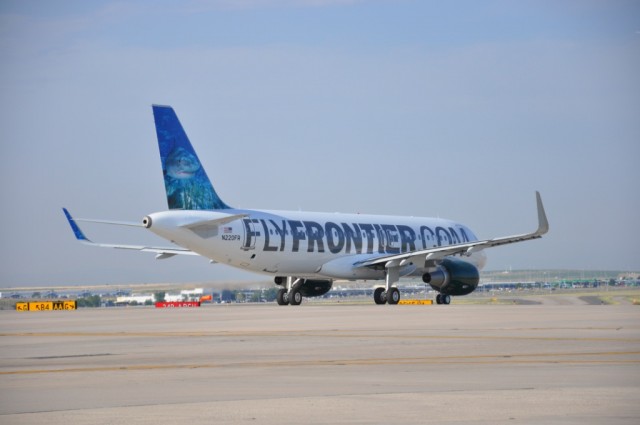
New Frontier Airbus A320 (N220FR) with sharklets – Photo: Frontier Airlines
Republic Airways Holdings has finally offloaded Frontier Airlines to a new owner, and right at the deadline. Earlier this week, Indigo Partners agreed to purchase Frontier and continue the push towards making them an ultra-low-cost carrier (ULCC). Indigo and its head, William Franke, know a thing or two about ULCCs; up until recently they were responsible for Spirit Airlines’ growth to become a leader in the segment.
Frontier’s acquisition by a new owner obviously raises questions about their future, particularly as it relates to their home base of Denver International Airport. Since 2006, when Southwest Airlines started ramping up its presence, Denver has been a three-carrier hub (with United Airlines being the third). Many have doubted the stability and longevity of such an arrangement; as a Denver-based flyer, I can attest to the fact that the three carriers have managed to keep airfares extremely low.

Allegiant MD-80 and Spirit Airbus A319 hanging out in Las Vegas. Photo by Joe (JX).
With Spirit Airlines raising their carry-on fee at the gate to $100 ($35 if you pay ahead of time after November 6th) and Allegiant Air starting to charge for their carry-ons, it has a bunch of people very upset. But why? If an airline comes out with a policy you do not agree on, do not fly them. They will get the message and either change their policies or go out of business. Even though people state they won’t fly either airline, both Allegiant and Spirit continue to grow, so why would they want to reverse their fees?
Yes, I realize that some passengers do not have many choices at their closest airport. However, there is a reason why other airlines are not able or willing to fly into those airports — they can’t make it profitable. So, you are either stuck with an airline that charges fees, one that runs turbo-props or you take the bus.
What interests me are the people that do have a choice, complain about fees, yet continually choose either of the two ultra low-cost carriers.
Being human, most people want their cake and eat it too. Passengers want a first class experience at an ultra low-cost carrier price. Sorry to break it to you — that is not going to happen.
When asked how Spirit Airlines views its fees, Misty Pinson, Director of Spirit Communications, told AirlineReporter.com, “Our ultra low fares with optional add-ons are very consumer friendly. We give customers the opportunity to save money with our low fares and give them the power to choose the extras they want, and they only pay for those they use rather than being forced into paying a higher fare that includes extras that they don’t even want or use.”
Some of you might be rolling your eyes thinking that Spirit is just spinning the fees as a good thing, but Pinson actually gives some good points. If I fly on another airline that might not have as many fees, but I don’t want a soda, I don’t have a bag to check and I am not interested in food, I am still paying for all of those things in my ticket price. Yet airlines, like Spirit, give you the option to pay less overall, if you are not going to use all the options. How is that unfair? Especially when you do all all the fees to the base fare, the overall price still comes under most other airlines.
I also reached out to Allegiant to check in on charging for carry-on bags is going. “Inevitably, when you start to charge for something that used to be free, there will be some people who are vocal about it, but ultimately, we have seen that only about a third of our customers are purchasing overhead bin space when they make their travel reservations online,” Allegiant spokesperson explained over email. “As we unbundle our product and drive down base fares, we are able to stimulate demand and see growth in the number of people who can afford to travel.”
Let’s take a closer look at how both airlines have been doing; comparing the first quarter of 2011 to 2012, both airlines did very well (all data from SEC):
ALLEGIANT
Revenue Passenger Miles (RPM) are up 17.2%
Passenger revenue is up 25.8%
Average fare is up 6.7% to $94.95
Average fare (ancillary revenue) is up 4.2% to $37.75
SPIRIT
RPMs are up 18.8%
Passenger revenue is up 17.5%
Average fare per passenger flight segment is down 6.9% to $76.65
Non-ticket revenue per passenger flight segment is up 21.3% to $51.68
That 6.9% decrease is important to note. It indicates that the people who don’t buy anything else are getting a better deal on Spirit flights.
If you were an airline and wanted to make profit (when it comes down to it, that is what every airline wants right?) and you have this business model that makes you profit, while you continue to grow your passenger load, why wouldn’t you do it? There is obviously enough demand for airlines like Allegiant and Spirit to exist with other domestic carriers Southwest, Alaska and Virgin America as well.
Many feel that ultra low-cost carriers have started a race to the bottom for overall experience. I disagree. They have provided a cheaper option for people who care more about getting from point A to point B as cheaply as possible than they do about amenities. If you want to ride in style, you can still pay more to fly in first class on another airline, not have to pay any fees, get more room and even a meal. The “golden-age” style of flying still exists, but it will just cost you much more (like it did in the “good ol days”).
If you are still angry about all those airline fees, it is okay to be angry — just don’t blame the airlines. If you are going to blame anyone, blame those passengers who see them as a better overall deal and create the demand for airlines like Allegiant and Spirit to come along and fill.
Alright, let’s hear it… what do you think of these new/higher airline fees?
A huge thanks to Dan Webb for helping me with these numbers and to Joe (JX) for letting me use his photo.
As many of you have probably realized by now, yesterday was April Fools Day*. This was an opportunity for airlines, with a sense of humor, to break out their best creativity and come up with stories that are almost believable — almost.
Last year I found ten airlines that went all out on Aprils Fools, but this year there didn’t seem to be as many who were in the spirit. Here are the ones I found:
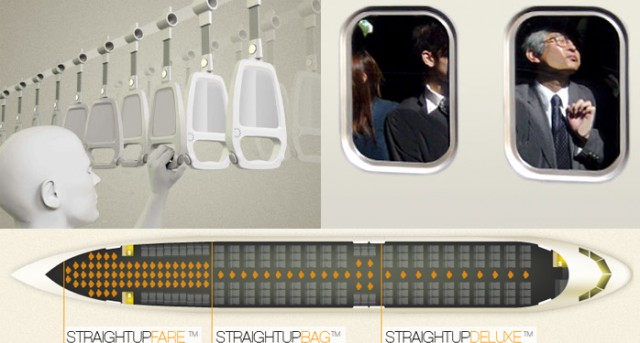
How would you like to spend your next flight standing up? All images by Air New Zealand.
Air New Zealand offers STRIGHTUP Fares for those willing to stand while flying
From Air New Zealand’s press release: Air New Zealand’s Domestic airline is proud to introduce STRAIGHTUPFARESâ„¢, the next step in the evolution of affordable domestic air travel on sale to anyone who can ‘stand it’. The special fares are part of the airline’s Grabaseatâ„¢ promotion.
For the April 1, 2012 launch date, the airline has installed hand holds on the cabin ceilings of selected aircraft to allow even more passengers per flight. The new “seating” plan can accommodate up to 69 extra passengers standing in the aisle for the duration of the flight, massively increasing Air New Zealand’s capacity and drastically lowering ticket prices.
The fares are offered at three different levels: STRAIGHTUPFARESâ„¢ – The standard offering includes carry on baggage only, STRAIGHTUPBAGâ„¢ – Includes carry on bag and one checked in bag up to 25kgs, and STRAIGHTUPDELUXEâ„¢ – Includes carry on bag and one checked in bag up to 25kgs, inflight refreshments and a interactive handhold.
Fare restrictions:
* Height restriction: 150cm Minimum height, excluding wheelchair passengers.
* Girth restriction: STRAIGHTUPFARESâ„¢ 100cm max waist, STRAIGHTUPBAGâ„¢ 120cm max waist, STRAIGHTUPDELUXEâ„¢ 150cm max waist
* Standing passenger must possess at least one fully functional arm and one fully function leg or equivalent. Wheel clamps provided for wheelchair passengers.
Going to their special STRAIGHTUPFARES website, they quickly point out that this is not real.
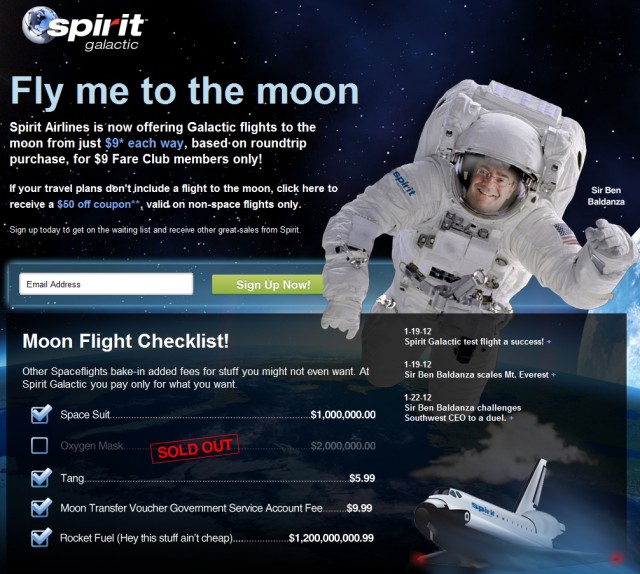
Who wants to go to space? Spirit can take you there. Image from Spirit Airlines.
Spirit Airlines Offers $9 Each Way Trips to the Moon
What is funnier than Spirit offering to take you to the moon is their ability to make fun of themselves. They are known as an ultra low cost carrier and charge for everything (even your carry-on). So they might have $9 each way fares advertised, but adding in your space suit, oxygen mask, tang, government service fee (good thing that is not hidden) and the rocket fuel, you are looking at a $1,203,000,025.97 ticket. Classic.
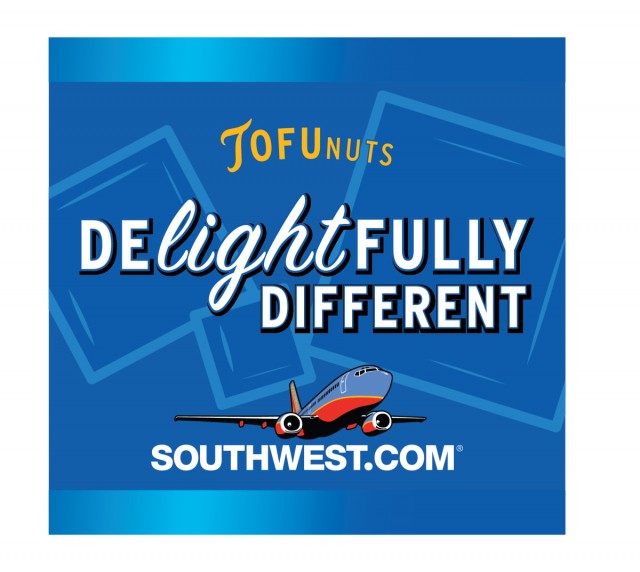
TOFUnuts on Southwest? Please no. Image from Southwest Airlines.
Southwest Airlines Now Serving TOFUnuts Onboard
Mmmm. TOFUnuts. Thank goodness this is a joke. From the airline’s press release: Southwest Airlines today begins serving a delicious onboard snack in addition to the carrier’s legendary peanut offering, TOFUnuts. With the same salty taste, TOFUnuts contain more protein than Southwest’s lightly salted peanuts. Customers who stop in the airport terminal for that savory cheeseburger can wash away the guilt knowing that a packet of TOFUnuts will help lower bad cholesterol. Other benefits include appearing younger as Customers step off one of the carrier’s LUV jets since the isoflavones in the TOFUnuts scavenge free radicals to prevent premature aging.
“We didn’t think we could top our world famous peanuts, but this little baby has real potential,” said Kevin Krone, Southwest Airlines Vice President of Marketing, Sales, and Distribution. “If you aren’t in the mood for our traditional peanuts, then get on the tofu train. I mean, a snack food and healthy skinsign me up!” Read more…
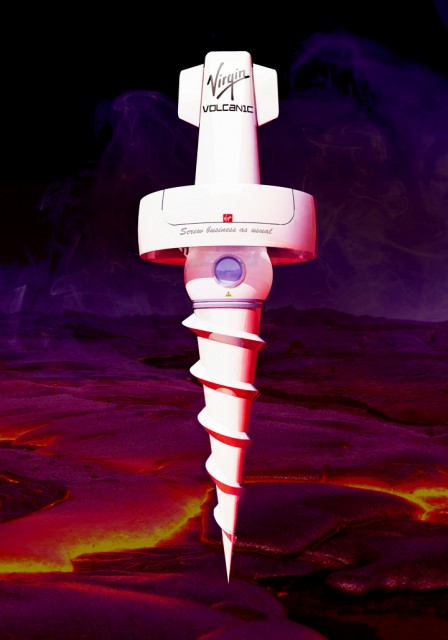
The new VVS1 will be able to take up to three people down to the Earth's core. Photo from Virgin.
Richard Branson launches journeys to the centre of the Earth through Virgin Volcanic
From the “official” press release: Richard Branson launches journeys to the centre of the Earth through Virgin Volcanic. Academy Award winning actor Tom Hanks to join first expedition. Only 500 people have been to space, only three people have been to the bottom of the ocean, but no one has ever attempted to journey to the core of an active volcano. Until now. Using patented carbon-carbon materials pioneered for deep space exploration, Virgin is proud to announce a revolutionary new vehicle, VVS1, which will be capable of plunging three people into the molten lava core of an active volcano. Read more…
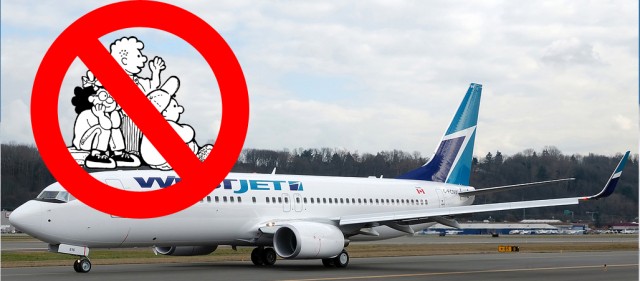
WestJet says no to kids? Origional photo from Andrew Sieber. Click for orig.
WestJet Introduces Child-Free Cabins
From WestJet’s website: Airline unveils Kargo Kids, a travel program to create a serene travel experience. WestJet today introduced Kargo Kids, an exciting new program allowing guests to travel on select child-free flights, creating a quieter and more relaxing inflight experience, while children travel in a “special VIP” area of the aircraft. “As Canada’s low-cost airline, we are constantly looking for innovative and fun ways to enhance the guest experience,” continued Richard Bartrem. “The initial feedback on Kargo Kids has been quite positive and we’re looking forward to the peace and quiet while we get families where they need to be.”
WestJet even went as far as making a video.
If I missed any, please let me know in the comments!

Spirit is not afraid to give their opinion about the new rules on taxes and fees.
If you have been on Spirit Airline’s website recently, you might have seen a big warning taking over your screen. The warning shows Spirit’s disdain for the Department of Transportation’s new fees and tax regulation that require airlines to include fees and taxes in their advertised prices. The warning states, “New government regulations require us to HIDE taxes in your fares. This is not consumer friendly or in your best interest. It’s wrong and you shouldn’t stand for it.”
Senator Barbara Boxer, D-California, is not happy with Spirit’s actions and has asked the airline’s CEO, Ben Baldanza, to remove the warning message off the website. Spirit Airlines is disappointed by the letter and spokeswoman Misty Pinson told CNN, “We would normally expect Senators to encourage 1st Amendment protection.”
“We have always shown taxes before someone purchased. They now want them hidden. It is wrong and we will fight for consumers,” Pinson said. Spirit is concerned that the government will be able to raise taxes without customers knowing and blaming the airlines for higher overall costs.
Why is the government targeting airlines? In most places in the US, you see a list price and know you will have to pay more (ie taxes) when you check out. Let’s take buying a car for example. It might be advertised as a $19,999.00 vehicle, but after adding taxes, licenses, dealer fees, interest and others, that $20,000 car ends up costing you much more than advertised. Why does the government feel the need to regulate the airline business, but allow other areas to do business as usual?
These new rules might not be permanent. Yesterday, Representative Tom Graves, R-Georgia, introduced legislation to counter the new rules. “If the American people can’t see these costs clearly, I fear it will be easier for these fees and taxes to be raised without their knowledge,” Graves said.
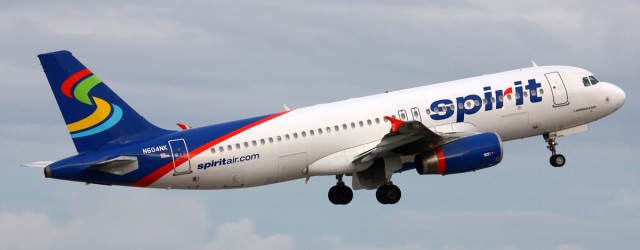
Spirit Airlines Airbus A320.
I asked some of my Twitter followers what they thought about the new regulations and Spirit’s reaction and I want to share a few reactions:
“As if raising fees is done in secrecy. Spirit has lost my support. Final price is the way to go,” @gusnyc.
“Seeing as taxes make a bulk of tix price for flying, it should be shown,” @MichaelLacek.
“I’d love for stores to show prices with taxes included. Shopping in sales tax-free Oregon is strange yet awesome,” @quanterium.
“Two flights advertised as the same amount but which “ring up” differently is bad for consumers,” @iansltx.
“Super easy way to show it: Total Fare: $275. Fare: $200. Taxes/Fees: $75. Why is everything airlines do so damn hard?” @smtpboy.
“It’s about time! Stop whining Spirit!” @PiloTgod.
“@spiritairlines is just mad they can’t advertise $9 fares anymore,” @amolkold.
Ah, I think @amolkold might have hit the nail on the head. Spirit loves to talk about their $9 fare deals, which always end up costing more than $9 after all the fees and taxes. Having to add those fees and taxes up front wouldn’t allow the airline to advertise a flat $9 fare.
As a la carte pricing becomes more popular with airlines, it seems to cause additional anger with many passengers. Even with a growing dis-like for fees, passengers keep on paying them and flying on airlines, like Spirit, who are well known for their low prices and plenty of fees. If passengers truly hated the airline and their way of doing business, they would not be in business.
Of course, all this over-reaction could just be another publicity stunt for the airline. Spirit has been known to come up with crazy ads and stunts to get free publicity. Although I am sure that this new rule hurts the airline’s bottom line, it has also given them the opportunity to once again garner a bunch of free publicity (including from me).
No matter your thoughts on the new rule or Spirit’s actions, it is pretty interesting to see an airline that is so vocal about a law. Seems like this rule could still be over turned.
Spirit A320 Image by Justin Pistone
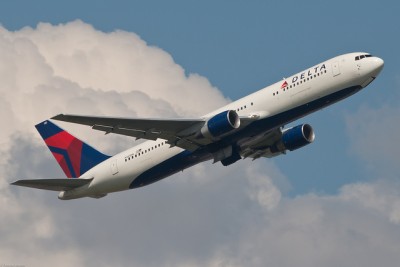
Delta Air Lines Boeing 767-300ER.
There is no question that Delta Air Lines made a lot of money off bag fees last year — $952 million to be exact. While many other airlines made a load of money with bag fees as well, Delta gets the majority of the attention since they made the most. Some attention has been in late night routines (okay, Conan’s bit is hilarious, if not fully accurate) and others have been negative news articles. It seems odd that so many companies are getting pats on the back for making profit out of the bad economy, but airlines end up being punished, like they are somehow earning their money illegally.
Dan Webb, on his blog Things in the Sky, shows that although Delta made more in bag fees than other airlines, that doesn’t mean it is a large percentage of their revenue. His post has a very handy chart that shows that Delta’s bag fees are only 3% of their overall operating revenue. When looking at all major US airlines, Delta is actually 9th in the percentage of bag fees to total operational revenue with ultra low cost carriers Spirit and Allegiant at the top the list with 10.5% and 8.7% respectfully.
There are a lot stories out there hating on the bag fees, but one of my favorites is from Boston’s NCEN.com titled Fuming over Bag Fees. It is a classic story talking to passengers who are up in arms for the airlines not being “honest” with them and hiding these bag fees. Even for people that do not travel often, it is pretty difficult not to know about bag fees. For those that do not, every airline I have ever flown makes it quite clear when booking your ticket, if there will be additional fees for luggage so one can plan accordingly. Passengers in NCEN’s story act like airlines are literally opening their wallets and stealing their money. The author, Peter Howe, states that airlines are “addicted” to fees like they are some nasty habit that should be kicked. Since when does a business not like a new idea that makes them money and allows them to survive? Without bag fees, you can be certain that not as many airlines would be able to survive, there would be less competition and airfares would be higher overall.
Airlines are not charities — they are businesses looking to make profit. Airlines had this idea to charge passengers for bag fees, obviously many passengers pay this fee and airlines are able to make a profit. Why would an airline get rid of these fees? Customers have the ability to vote on these fees with their pocket book. Southwest Airlines and JetBlue both don’t charge you for checking a bag (on Southwest, you can check two for free), but of course, they are not always the cheapest option, even when checking a bag.
All that being said, yes I know that they are annoying when you are checking in and you have to drop another $50.00 for two bags. I do whatever I can to avoid paying bag fees myself and cringe when I end up having to pay them.I wish airlines would do a better job explaining why they are charging the fees. It seems like most airlines are like “we are charging them, take it or leave it approach.” I do not think most customers realize that weight costs money and instead of selling it as, “if you have a checked bag, you will owe more,” sell it as, “if you do not have a checked bag, we now let you save money.”
I believe that ala cart pricing will be the future of airlines. Many other businesses operate this way and why should I have to pay for something that I don’t want to use. When I book a hotel room, I might cringe when I have to pay $25 for parking and $20 for Wi-Fi and $5 for a bottle of water, but it is understandable. Why should parking be built into my hotel price if I do not have a car?
Image: Thomas Becker









